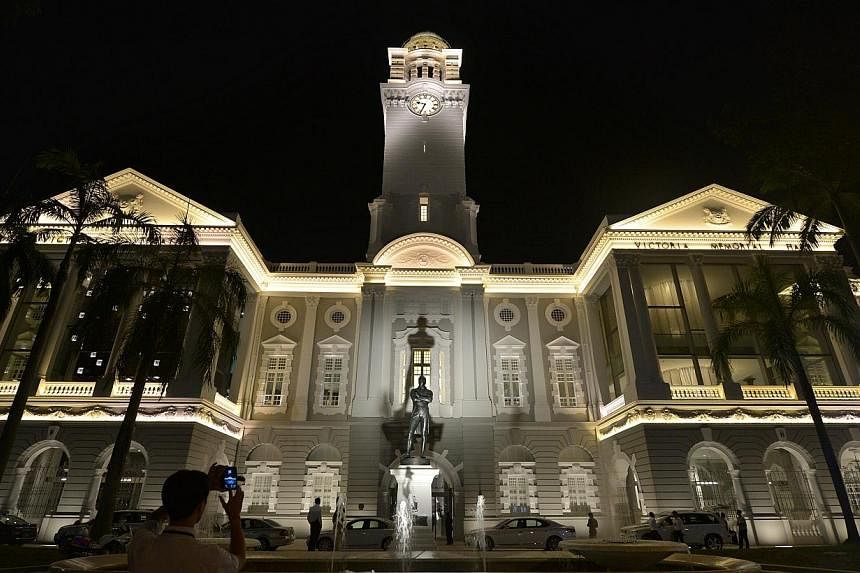A resident company programme, granting theatre groups long-term access to performance venues such as the Drama Centre Theatre or Victoria Theatre. A dedicated space for children's theatre.
These are among the slew of new initiatives in the National Arts Council's recently released Performing Arts Masterplan. There are also plans to boost dance as a career and the arts council will take over as lead coordinator for music, including pop music, from the Media Development Authority.
The masterplan, a detailed report drawn from several years of consultations with and assessments of the arts industry, is the first to focus on the performing arts. Covering theatre, dance, music, visual and traditional arts, the plan outlines the council's vision for the scene and sets out its work with the arts sector for the next five years.
The ideas range from the gestational to the concrete, from the creation of an arts guide to raise public awareness of arts events, to making the traditional arts more easily understood.
Many of the ideas are in line with the Arts and Culture Strategic Review of 2011, a report by a high-level committee which charted various courses for the arts.
There are also overarching plans to better support the process of artistic creation, build connections within the arts industry, develop connections with audiences, improve research and documentation of the scene, and to push for internationalisation and the growth of Singapore arts abroad.
The full report is available on the council's website at www.nac.gov.sg/art-forms/pa-masterplan.
The arts community responded with cautious optimism to the council's vision, but reiterated that these plans would have to be implemented well, with continued consultation of the industry - and felt that some of the proposed plans were still at a very early stage.
Actress Janice Koh, a former Nominated MP for the Arts, says: "I think a plan like this is necessary because other than providing the big-picture vision, the council needs executable steps to get there. This plan is fairly detailed and specific.
"I believe they've gone through a process of consultation where feedback was gathered as to what these executable steps should be and they're trying to put that in place. I appreciate that."
The resident company programme for theatre proposes allowing companies the long-term use of a variety of theatre spaces, which includes those in educational institutions such as the National University of Singapore or Lasalle College of the Arts.
While details about cost and spaces have not been revealed, the report states that "this would enable and develop the capabilities of major theatre companies to create, produce and present a repertoire of works that can have long runs and create visibility for themselves. It also enables companies to improve the quality of their programmes over time (and) build audiences through a more complete strategy... beyond main-stage shows".
Alvin Tan, founder and artistic director of The Necessary Stage, felt that the resident company programme was a promising one, citing groups such as The Theatre Practice or Pangdemonium as good fits for a platform such as this.
He says: "It's infrastructural support - groups can actually do more because there has been a lot of concern over the high cost of theatre rentals, which has been going on for some time. I think the council is coming in with very concrete solutions. But I guess the devil is in the details as to how it is implemented and carried out."
Children's theatre also had the spotlight, with plans to improve programming, train practitioners and establish a dedicated space for young audiences as a Children's Arts Centre.
Brian Seward, artistic director of children's theatre company I Theatre, hopes this envisioned centre will not be one inundated with international acts, leaving local companies scrambling for a section of the market.
He says: "The market is saturated. Every month, there's a new production from somewhere in the world. I do not want to see another arts centre which brings in a lot of international acts and the locals have to compete with them. It would be counter-productive and wouldn't change the mindset of 'local, bad; international, good.'"
But he adds: "I think it is excellent that children's theatre is finally being recognised as an artform rather than as pure entertainment. To have so much support being put forward for it is excellent."
The arts council announced that it would take over the role of lead coordinator of the music sector - from classical to pop music - from the Media Development Authority next year. While the authority will continue to regulate and oversee music in film and television, its grants will now come under the arts council.
The council aims to develop a greater appetite for Singapore music, whether in featuring musicians more prominently in the media and on air, supporting them on online platforms such as YouTube or helping them to go regional or international through exchanges abroad.
But singer-songwriter Sarah Cheng-De Winne says a lot more has to be done to promote the music scene here. For musicians such as herself, who are "overqualified" for the council's Noise platform for emerging artists and have gone through the industry event Music Matters, she is not sure what the next step is for her in terms of governmental support.
She says: "It has to be very carefully structured. It cannot be short-term - 'I'm going to give you two years to try' or 'I'm going to fund you for one EP.' What about independent artists who need the funds for a full album?
"The grants system needs to be carefully looked at. We have to create incentives for private entities to fund artists. I'm currently doing a crowdfunding campaign for my upcoming EP. If, let's say, the arts council says, 'for every $10,000 you raise, I'll match half of that'. Then the artist takes ownership to raise funds and the council is going to support whatever we're raising. It's not just a one-time thing."
In the dance sector, the council aims to boost support by easing the transition for dance graduates from school to the professional scene. On the cards are programmes such as internships, supporting dancers in mid-career transitions through scholarships and grants, and making information and resources more easily available to young dancers.
The Goodman Arts Centre's Dance Studio has been pitched as a possible space to host independent dance practitioners and the council hopes to develop audiences by possibly dedicating a day to the celebration of dance in an attempt to make the artform more visible. It will be a large-scale event involving both commercial and non-profit dance groups.
Singapore Dance Theatre artistic director Janek Schergen was concerned that the report had cast dance as a "risky" occupation, which he felt could deter potential stars from pursuing it as a profession. "It sends a message that worries me," he says.
But at the same time, he felt that all the council's recommendations were "perfectly valid, logical and well thought out", and was glad it had recognised that Singapore still lacks an institution where dancers can be trained at a very high level.
There are also plans to bolster the traditional arts industry, which has long faced the threat of a diminishing audience base and the public perception of being uninteresting or passe. The council launched its Traditional Arts Plan in 2011 to reach out to audiences, improve production quality and develop talent, dedicating $23 million to the sector over five years. The performing arts plan pledges to continue to nurture talent in the traditional arts, research and document various artforms, and continue to reach out to new audiences.
Singapore Chinese Orchestra general manager Terence Ho feels that this move is encouraging, but says: "For the traditional arts, you need a double effort to grow the audience and productions, compared to other artforms. We have to be very strategic, if not, we will waste a lot of resources."
Bhaskar's Arts Academy's company manager Thava Rani Mohan says of the plan: "It sounds very general. But it's definitely exciting because now we know that they are trying to do something."
Ms Koh says of the arts council's vision: "If you look at other arts councils abroad, you'll notice that some councils take it a step further, and have very detailed short- and mid-term plans for each artform. It's not just a couple of pages, it could be a 40-page document.
"Given that the various artforms in Singapore are at different stages of development, eventually, we need to get down to the nitty-gritty and come up with more detailed strategies for their development. Big, overarching visions often sound good in concept, but how do we actually get there?"
Follow Corrie Tan on Twitter @CorrieTan
To read the full report, go to nac.gov.sg/art-forms/pa-masterplan


